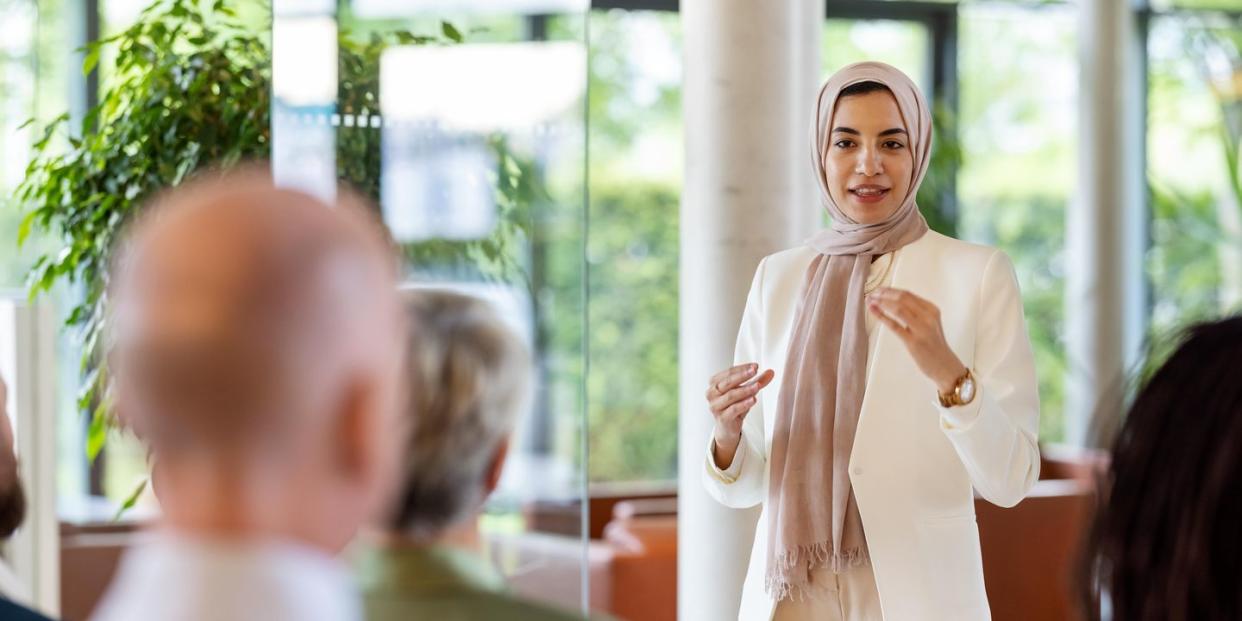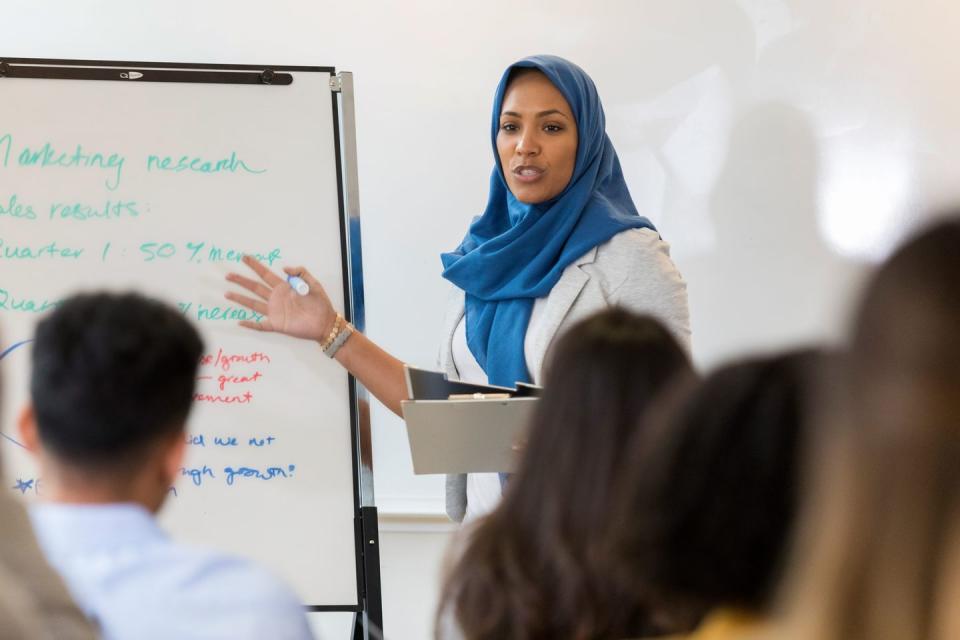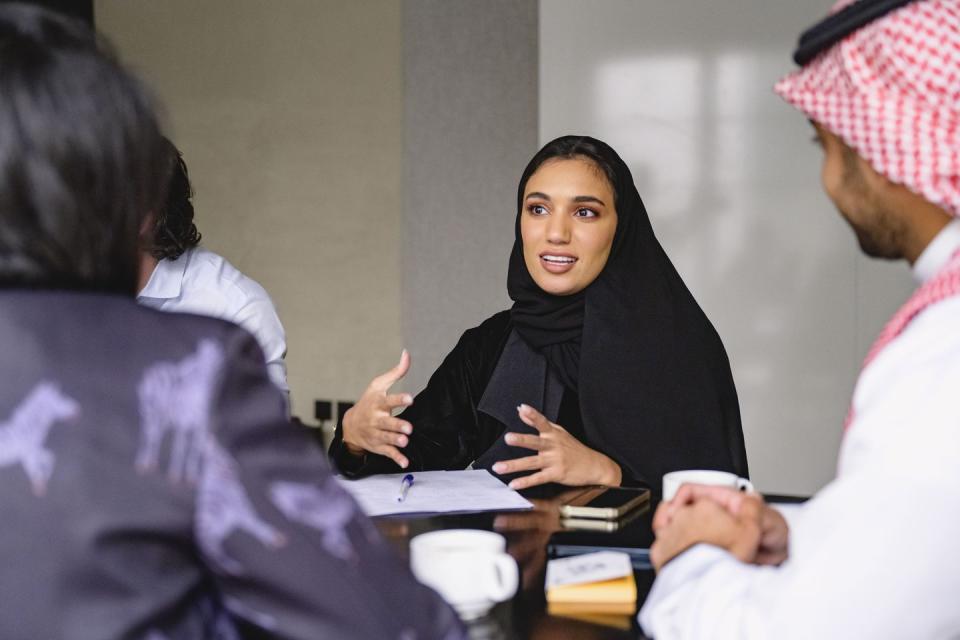The Women Pursuing Entrepreneurialism As A Means Of Survival

'In my country, entrepreneurship is survival,’ says Rania Ayman from Egypt, when ELLE UK meets with her at the One Young World summit in London in September.
Ayman, who turned 30 days after our interview, is one of many young women from underdeveloped or strictly religious countries where the historical precedent - for women's roles to be solely domestic - has impacted their drive to change the course of their futures.
Just 21% of the workforce in Egypt is female, and according to the World Bank, even less of those women are (18%) are employed in the private sector.
While the pay gap in the UK sees women take home 7.9% less than their male counterparts, in Egypt, women employees earn on average 34% less per hour than their male counterparts.

Due to the stigma attached to working as a woman in Egypt (which spans the northeast corner of Africa and southwest corner of Asia), employers are less likely to hire them, as Ayman, founder of women leaders support network Entreprenelle, stresses.
It's the reason that ambitious women like Ayman (whose business' name was inspired by ELLE magazine, as it happens) have ventured into self-employment and entrepreneurialism as a way of circumventing a system that is stacked so strongly against them.
Furthermore, Ayman explains, if you're unmarried or single in a country that strongly favours male breadwinners, the financial burden of living without a partner only compounds the sexism in the workplace, and the barriers to entry for women.

As per UNICEF, women in the poorest circumstances marry four years earlier than those in wealthier environments.
This points to the reality that for women in countries like Egypt, marriage, rather than a career, is often the only way to achieve stability, security and solvency.
However, one thing is for certain: the tide is changing.
Women's entrepreneurial activity has increased in Arab countries such as the UAE, Saudi Arabia, Jordan, Morocco, Algeria, and Lebanon, according to the Mastercard Index of Women (MIE) Entrepreneurs' 2021 report.
The same report showed that in Saudi Arabia alone, 87% of women entrepreneurs started a business to build wealth for greater financial autonomy.
Mastercard, recognising this shift in behaviour, has made a global commitment to connect 25 million women entrepreneurs to the digital economy by 2025.
The reality, of course, is that women in many Arab countries don't simply choose to be businesswomen, they have to be, but whatever the impetus, female independence is growing.
@jamila_mayanja is quite powerful passionate woman #OYW2022 absolutely pulls the best. Check out her work @smartgirlsug https://t.co/TKYJAPCMCx
— Ⓜ️Moncɛrɛ. (@GarikoIbrahima) September 6, 2022
While female entrepreneurship is on the up-and-up, the challenges remain steadfast. Ayman, who majored in marketing at university and graduated in 2013, says that working for yourself is often 'the only way for women to have access to money,' making it 'a necessity'.
She also says, though, that it's 'very challenging' to get enough support for a woman entrepreneur to thrive, and explains that people don't tend to invest in women, because of all the same stereotypes mentioned above, that present barriers to female employment, pay and promotion.
No matter the challenges you are facing 🤍, downs, hard times and pitfalls … always remember why did you start! and push a little bit more … you came that long 👏#Women #Entrepreneurs . #Startups . #DREAMShttps://t.co/qF7Z6ZZfQI
— Entreprenelle (@EntreprenelleME) March 25, 2021
Jamila Mayanja, 34, founder of Smart Girls Uganda, started her business to tackle the female unemployment rate and train young women to grow their skillset.
As of February 2021, 34.9% of seats in parliament were held by women in Uganda, one of the most underdeveloped countries.
Mayanja echoes Ayman's sentiment, saying: 'If women are empowered they should start their own businesses,' and going further to say that entrepreneurialism, and the independence that it fosters, is one of the things that can help women break free from gender-based violence.
'One of the biggest causes of gender based violence is the power the men have over the women when it comes to money,' she insists.
Champions of Change!
One of our Youth for Change member, Ms. Zuhura Sakaya, will participate on the Oslo Freedom Forum on 25 May 2022. She will speak and share her experiences on the Tanzanian Child Marriage Struggle. @PlanNorge @OsloFF #Championsofchange https://t.co/zshVXHU3w4— YouthForChangeTz (@Youth4ChangeTz) May 21, 2022
'I do not just train young women to just work, I train young women to be innovators and solution solvers,' Mayanja concludes.
Zuhura Abdul Sakaya, 27, from Tanzania is a World European Commission Peace Ambassador at One Young World, Masters of Science student in Management and Information Systems, and Co-founder for organisation Youth For Change (YFC) Tanzania.
Sakaya came up with the idea for YFC while at university, along with fellow female students - all of whom have or know someone close has experienced gender-based violence.
She grew up in poverty and, in her family home, her father would often be violent towards her mother.

While she received funding to support her college and university studies, her ‘sisters didn’t get access to education'.
She almost gave up in her pursuit of a better life, after an announcement from the government introduced Tanzania's Marriage Act of 1971, allowing girls to be married as young as 14.
'This is never going to be changed,' she recalls feeling after hearing that news.
'We just cried and we just looked at each other. That really broke our hearts.’
Of course, like Ayman and Mayanja, Sakaya is desperately committed to enabling women to have options.
While female entrepreneurship is increasing in underdeveloped and strictly religious countries, it’s clear many women feel as though they are forced into it, burdened by the prospect of being career-less and financially insecure. As women rally together to change the script, issues such as gender-based violence, warped government policies and historical stigmas still present major challenges. Yes, more women are building wealth, developing financial autonomy and breaking gender biases, but the lingering expectation for them to perform solely domestic roles still stifles many women's efforts. What’s more, the women interviewed have sought entrepreneurialism after being denied access to other types of work, so doesn't the sheer fact it's on the increase suggest the barriers to entry and glass ceilings for women are as pervasive as ever, or only getting worse?
On the plus side though, with the World Bank's now infamous proof that women's education and involvement in the work sector is fundamental to a country's chance to hoist itself out of 'developing' status, more women clawing their way by hook or by crook into the workforce and financial independence may be just the key to turn the whole situation on its head. In a real world sense, the sisters are doin' it for themselves.
You Might Also Like


